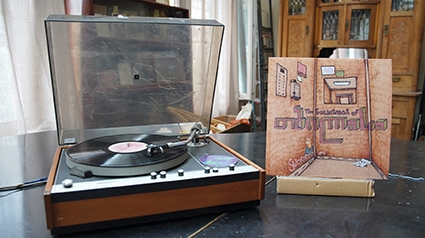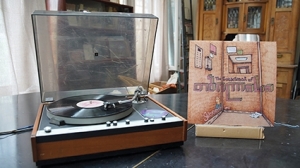Capturing the Vibe: What Does Tbilisi Sound Like?
On August 29, a new record appeared on the market. The Soundtrack of Tbilisi compiles 42 minutes of contemporary music from 11 Georgian artists. Each of them brought their own musical universe in a mix that captures the vibe of this fast-changing city, made of sharp dissonances and subtle harmonies. The record is the basis for the 2020 documentary by the same name, directed by Magnus Lorenz.
Interestingly enough, Magnus turned the creation process upside down and created the soundtrack before the movie. This do-it-yourself project came to life thanks to a crowdfunding campaign that raised nearly €5000. Independent artists also contributed for free, which somehow reflects on the indie mood and visuals of the album. Natia Benashvili created the cover: a typical old Soviet elevator, dusty and full of stickers, totally relatable for anyone living in Tbilisi. “We are looking for authenticity” said Magnus at the release party during his short opening speech about both the playlist and design.
Indeed, in the last years, foreign media have talked a lot about the striking development of the electronic scene in Georgia. Tbilisi has been pictured as the next techno-destination in Europe thanks to underground clubs like Bassiani, Khidi and Café-Gallery; they have shaped the musical tastes of the new generation and raised awareness on important social issues. One can dance to electronic music every single day of the week in Tbilisi, which makes the city somewhat unified in one musical genre, but gives few spaces for other tastes. However, this is the visible part of the iceberg: below the surface is a broad and vibrant scene that grows in smaller recording studios and venues.
The many faces of Georgian hip-hop
Hip-hop is certainly the most emergent genre of all at the moment, to the point that the BBC World Service’s team came in person this July to cover its blossom. The two prominent bands, MokuMoku and Kayakata had the floor to share their vision of art, music, and society in Georgia. They later released their first album ‘Sadaa,’ in August, which is infused with psychedelic trips and arty animations. The experimental hip-hop duo rap in Georgian, exploring and enhancing the musicality of their native language. They create a surreal language to talk about their Tbilisi, an urban jungle hidden in the Eurasian corner of the world.
Although not on the record, Kayakata is a major player in the Georgian hip-hop scene at the moment. They have featured with other Georgian rappers on many occasions, including DRO and Kordz, who are present on the face B of the Soundtrack of Tbilisi with their atmospheric, new school track “Rita”. It follows “Sleep on Me” from Creams, who delivers her nimble and confident flow to harsh deep beats. The only female rapper reflects here on her changing lifestyle, in an intimate and personal song.
MokuMoku is a bigger ensemble of 10 musicians, bringing more old-school, jazzy and funky vibes to Georgian hip-hop. They were touring in most of the summer festivals in Georgia and are currently working on their next album. Two of their members, Moku J and Moku T were gigging in Dedeana Bar on August 25 for the now traditional Sunday Hip-hop night, going from 90s trip-hop to new school rap with ease and taste. It was surely a prolific summer for the band, with Moku T releasing his first solo instrumental album this June, ‘In Thru Mentals,’ made of underrated samples and lo-fi beats from diverse influences. MokuMoku appears on The Soundtrack of Tbilisi with their song “Sugar Glider” on face A.
Ambient Tbilisi
Fitting perfectly with the grey and brutal architecture, ambient music is also defining the musical universe of Tbilisi. The Soundtrack of Tbilisi actually opens the song “Daisi” from the two experimental musicians TeTe noise & VAZHMARR. On his webpage, TeteNoise describes his music as a “sound/noise collage [...] recorded in his home studio the Tbilisian streets.” The musician and producer has been crafting his own universe since 2009 and lately worked on the soundtrack of Uta Beria’s new movie, Negative Numbers, released in July 2019.
Theosophy is another label that supports and promotes niche ambient artists, such as Saphileaum, Mind Static and Isodrome. The later dedicated one of his new tracks, ‘Source,’ to Tbilisi; the deep sonorities lightened by some melodic notes, capture the melancholic feeling that sometimes penetrates the city. The label describes itself as a “bright, living beam of light in our troubled world”, mixing cosmic-like sounds to more tribal, hypnotic rhythms.
Always acoustic
Georgians’ passion for singing is nothing new; polyphonic singing is the cornerstone of Georgian traditional music, and probably the most well-known genre among tourists. The women’s choir Ialoni perfectly illustrates this unique culture with their song ‘Patara Zvima,’ on face A of the Soundtrack of Tbilisi. The record is also making rooms for acoustic and rock bands such as Ara, Bedford Falls, Ezos and Kid Jesus who close the record’s musical journey.
Last but not least, Lua, winner of Georgia’s Newcomer Award, is of course part of the project with a brand new song ‘Hello Yellow Lady Sun.’ She gave a live performance in Zoestan during the release party; the bar was literally crowded with Tbilisian music enthusiasts, and with the artists themselves.
Although the Soundtrack of Tbilisi is not setting new trends, it successfully shows the multiple colors of contemporary Georgian music. It is a musical illustration of the many layers that make Tbilisi a vibrant creative capital. The record is released in a very limited edition and only 100 copies are available for free sale. Copies can be purchased in the two branches of Dodo Beach Records in Berlin and in the Vinyl Salon Kiel. Both shops also offer international shipping. For the complete playlist, visit the website soundtrack.ge.
By Lorraine Vaney
Image: The Soundtrack of Tbilisi - by Magnus Lorenz











